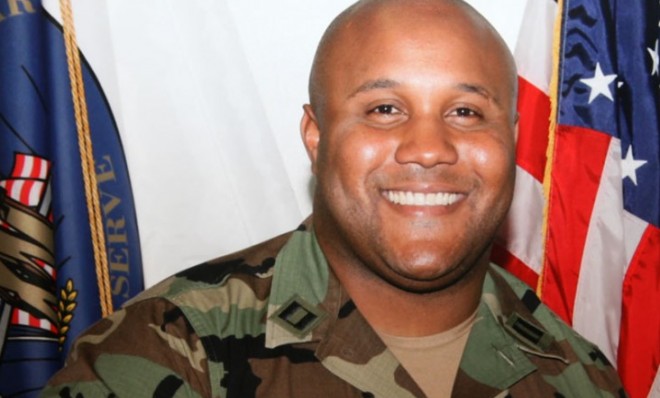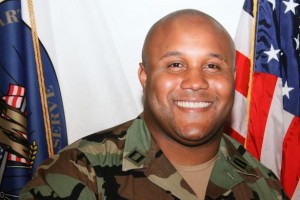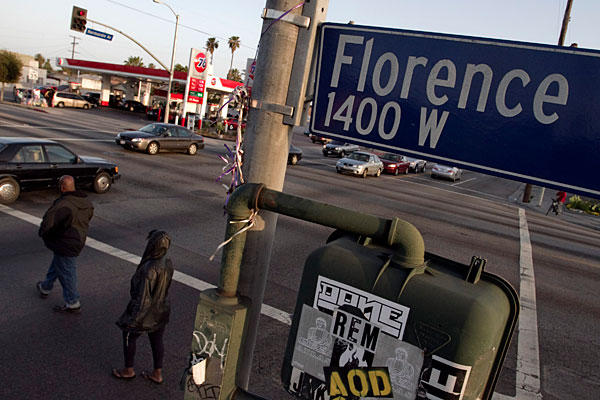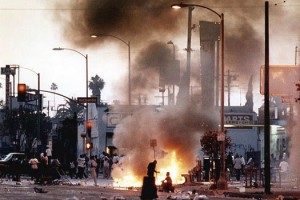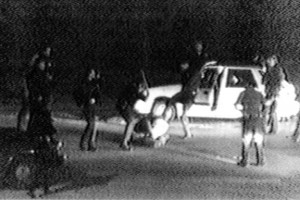 Twenty years ago most of Los Angeles was in flames. The news of the “not guilty” verdict in the Rodney King trial hit the streets within minutes; shortly after, a community took to the streets in anger that turned into rage and a thirst for vengeance and retribution by any means necessary. The city became unglued and fell helpless as all order was lost. Police officers were ordered to stand down in the wake of angry mobs looking on only as outsiders watching a community burn.
Twenty years ago most of Los Angeles was in flames. The news of the “not guilty” verdict in the Rodney King trial hit the streets within minutes; shortly after, a community took to the streets in anger that turned into rage and a thirst for vengeance and retribution by any means necessary. The city became unglued and fell helpless as all order was lost. Police officers were ordered to stand down in the wake of angry mobs looking on only as outsiders watching a community burn.
Critics say the police gave up when the riots erupted, letting big chunks of Los Angeles burn while looters and hoodlums ruled. The officers say commanders held them back, fearing that street clashes would produce endless violent video loops and countless battered Rodney Kings. To the community the system had failed and everything literally became black and white: All four white police officers had gotten away with savagely beating up an unarmed black motorist.
In 1992, where the LAPD was viewed as an occupying force in their neighborhoods, it was clear that a community was at war. Sgt. Rick Arteaga was one of six officers trying to face down 400 angry residents shouting at him: Four hundred years! You’ve been suppressing us for 400 years! Arteaga, just 29, was thinking, “What did 400 years have to do with me?” At that time, everything!
To this day some LAPD officers are still bitter about the call to stand down, which was infact the right call made not to engage a hostile community frustrated with the racist police tactics in their neighborhoods. On April 291992, The LA riots went down as the most destructive riots in US history that left 54 people dead, over 2300 people injured and over a billion dollars in property damage. It was a most disgraceful time for the LAPD as they became the poster child for police brutality and racism, especially when then Sergeant Stacey Koon publicly defended the use of force against Rodney King as legal and appropriate during testimony in his trial for beating King.
It was a most disgraceful time for the criminal justice system as all twelve jurors: ten white, one Asian and one Hispanic completely sympathized with the four police officers and couldn’t see how they violated King’s civil rights. After the trial, most of the jurors refused to go on record except for one juror who was interviewed on ABC’s Nightline. The juror was quoted as saying the cops were simply doing what they were trained to do and reacted in fear of King either running away or attacking them. It was a most disgraceful time for Los Angeles as the city was divided amongst racial lines as certain areas and communities were visibly neglected. Lastly, the LA Riots were a most disgraceful time for America, as the riots became a world symbol of racial tensions turning into racial destruction.
What has changed in 20 years? Right after the Rodney King beating, the US Attorney General launched a nationwide investigation reviewing all claims of police brutality. An independent commission led by Warren Christopher cited the LAPD for excessive force, racist cops, indifferent commanders and disdain for residents. Then-Police Chief Daryl F. Gates, who was known for his combative style, was castigated as a leader out of touch with the changing realities of the city. Two months following the riots he resigned. Community policing was prescribed as a way to restore the public’s trust and dilute the “siege mentality.” Its focus was on crime prevention and mutual respect between officers and citizens. In 2001 the Los Angeles Police Department entered into a court-mandated federal consent decree after a pileup of scandals and controversies, including King’s beating, the fallout from the deadly uprising that followed, the four police officers’ acquittal, and the Rampart scandal.
The eight-year oversight process ended in 2009, however as part of the reforms issued moving forward, all police cars must be outfitted with camera’s that will record all traffic and pedestrian stops. Also, the LAPD commission must conduct a series of reports on how police officials investigate and resolve claims of racial profiling. To help fight allegations of corruption, officers in gang and narcotic must submit financial records to supervisors. What has changed in 20 years? The LAPD has tried to change its reputation from community oppressor to community partner largely due to the consent decree and independent researchers.
Successive LAPD chiefs disciplined, suspended and fired officers for misconduct. The use of force by officers dropped. Citizen complaints leveled off. LAPD officials became constant presences at community events, meetings and forums, always pushing partnership and dialogue with the community leaders. Today crime is lower than it has been in decades, and 70 percent of L.A. residents say they approve of the LAPD. Twenty years ago, the LAPD was 59 percent white. Now that number is 37 percent. The diversification of the LAPD has helped changed its culture. However, the persisting issues of racial profiling and police brutality are issues that the department must continue to respond to swiftly and with vigilance.
Twenty years ago Los Angeles was a powder keg ready to blow up aside from the Rodney King beating. A high poverty rate in South L.A. where crime and drugs ruled the streets, neighborhoods that were among the most racially balkanized in the nation, angry over the hand slap sentence for Korean American grocer Soon Ja Du, who murdered 15-year-old Latasha Harlins after a dispute over a bottle of orange juice resulting in Black-Korean tensions boiling over. Today 68 percent of Angelenos surveyed believe that all four major ethnic groups are getting along better.
Lastly, what about South L.A where much of the damage and destruction occurred? South L.A. is still written off as banks, corporations, and government officials reneged on promises to uplift the community via home and business loans and social service programs. This is a problem as prosperity in South L.A. is constantly being put on hold due to persistent fears of criminal violence.
Twenty years ago, not everyone had access to cameras, the Internet, and social media. Modern technology has empowered more people to become watchdogs against police brutality with their weapon being the smartphone. Best believe if there is an altercation between a police officer and an individual with witnesses around, someone has a camera phone and is recording the incident ready to post it online.
 KC and Chris come back to talk about the subject matter in the movie Straight Outta Compton, the LA Riots, Rodney King, violence over sex, certain women referred to as a bitch, opening the door for misogyny, and black women’s relationship with rap music.
KC and Chris come back to talk about the subject matter in the movie Straight Outta Compton, the LA Riots, Rodney King, violence over sex, certain women referred to as a bitch, opening the door for misogyny, and black women’s relationship with rap music.

